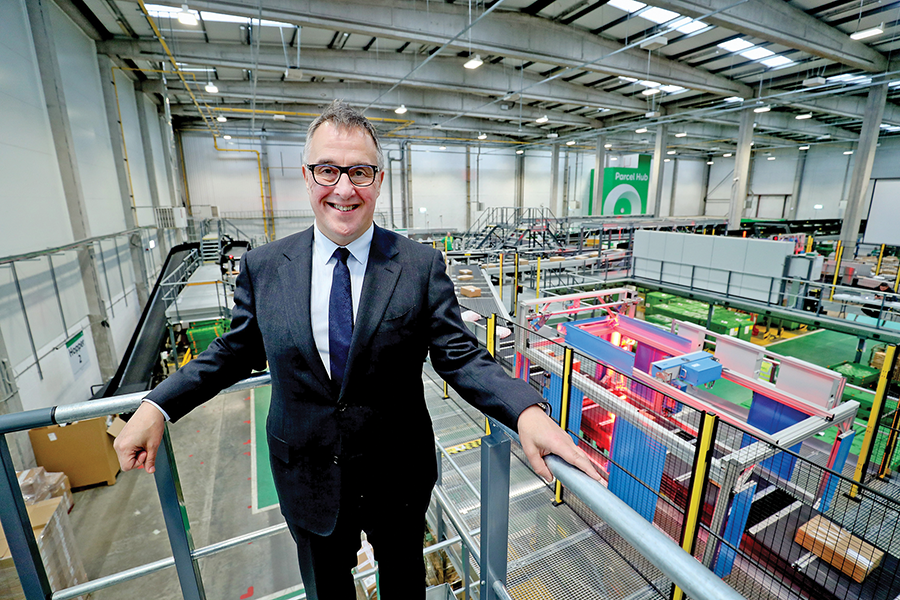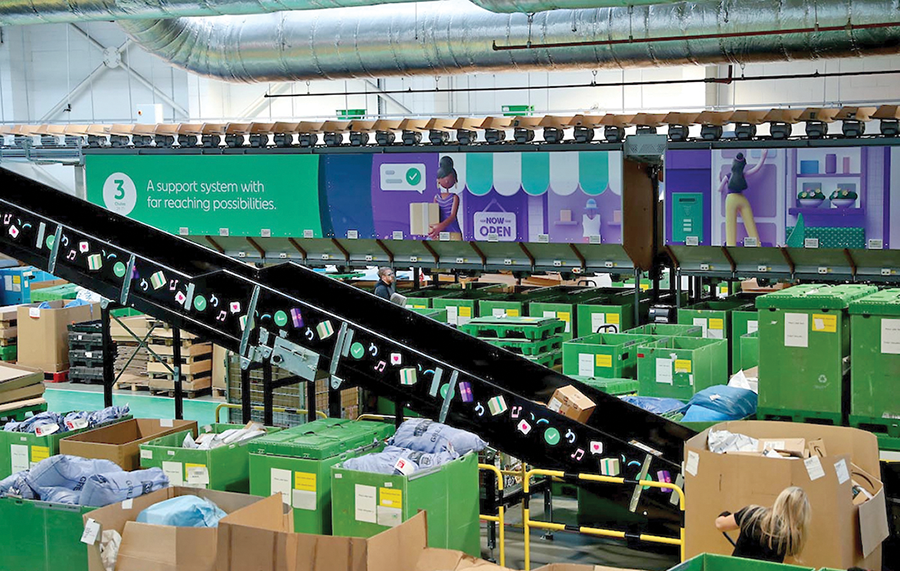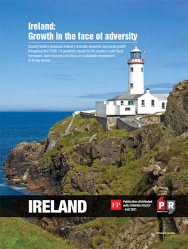Social Assistance Key Tenant for Post
David McRedmond, CEO, An Post, expands on the efforts Ireland's postal service has made to support the community during the crisis and its new strategy to remain relevant

An Post CEO David McRedmond at the recently opened Dublin Parcel Hub.
What is An Post’s strategy to remain profitable?
An Post has always been part of Ireland’s infrastructure. However, mail businesses have been in decline for several years because of email and electronic substitution. We have refocused our strategy to switch from being a mail company to performing e-commerce and parcel delivery. Our traditional post office business, which particularly looks after social welfare through people’s pensions and unemployment benefit payments, has shifted into an omnichannel business — meaning both digital and physical — in the provision of financial and government services.
Since we launched this strategy in 2017, our revenue has grown every year, including during the pandemic. Our business has moved strongly into profit. Although we had substantial expenditure during the COVID-19 situation, our underlying profitability remained strong. We were one of the few postal companies in the world that kept every mail delivery route and post office open every day throughout the pandemic. Our transformation has worked amazingly well, especially through the reliance on online retailing during the lockdown. An Post now connects Irish citizens with the global marketplace and facilitates trade.

What public initiatives did An Post make during the COVID-19 pandemic to support the Irish community?
An Post rediscovered its soul during the pandemic; we are a commercial enterprise, but at our heart we are a public service. Our purpose is to act for the common good and build social solidarity, now and for generations to come. At the beginning of the lockdown, we gave every household free postcards for children to send to grandparents, for lovers to send to each other and for people who could not connect physically to stay connected by post. People were sending postcards to health workers and politicians. It was a beautiful example of social solidarity.
We also elevated things that postal workers do naturally, such as calling in on the elderly and making sure they received the help they needed, whether it be groceries, medicine or messages. We set up a webpage where friends and family could register to have our postal delivery staff check in on their vulnerable loved ones. We also provided free postage for all letters and parcels going to and from nursing and care homes where the COVID-19 virus was extremely dangerous and visitors were barred. These initiatives really mattered to people and received tremendous response; it gave us the energy to keep collaborating with communities within our reach.
What is An Post doing to support the government’s strategy to lower carbon emissions?
Sustainability is the greatest challenge of our age; the Irish government is hugely committed to it. The legislation on climate change in Ireland has set some of the highest targets of any country in the world. We are signed up to the more ambitious level of the Paris Agreement, which means to limit global warming below 1.5 degrees Celsius, lower than the previous 2 degrees Celsius. An Post brought forward all our target dates. We were going to have reduced emissions by 50% by 2030, and we have moved that target to 2025. Our net-zero target for carbon emissions was set at 2050 and has been moved to 2030. Our targets are scientifically measurable, and we publish a sustainability report annually.
“An Post rediscovered its soul during the pandemic; we are a commercial enterprise, but at our heart we are a public service.”
A major challenge around our climate action plan is increasing the electric vehicles in our fleet. Dublin became the first major capital city in the world with zero carbon emissions from its post. However, we have work to do. We now need to convert our heavy goods fleet to electric, although we require the technology to do so.
Our strategy is also aligned with the United Nations’ Sustainable Development Goals. We are committed to proper employment, pensionable pay, sick pay and proper terms and conditions for our workers. We are also developing sustainable communities by making sure post offices are accessible to everyone and taking on initiatives to help vulnerable people stay connected.
How has An Post used digital platforms and fintech to improve its operations?
Because of the economic crash, people’s relationship with main banks was strained. An Post provides an alternative model through An Post Money, which offers standard services and more in a simple format at exceptionally good prices. We provide accounts and loans. We will also soon be providing mortgages.
Doing good for citizens — particularly those citizens who are at the margins and who are unbanked — is crucial in building a better society. While fintech is important, so is physical money and cash. A cashless society leaves vulnerable people even more vulnerable. It is vital we make sure we provide old-fashioned services as well as digitally enabled services. Our fintech capabilities are part of our sustainability pledges. For example, through An Post Green Hub one can receive a low-cost, long-term loan to refurbish homes to improve energy efficiency. One can sign up for a builder, get permission from local authorities and receive government grants all in one place. This allows individuals to easily contribute to the country’s sustainability goals.
Ireland: Growth in the Face of Adversity Report Contents:

 Download the PDF
Download the PDF